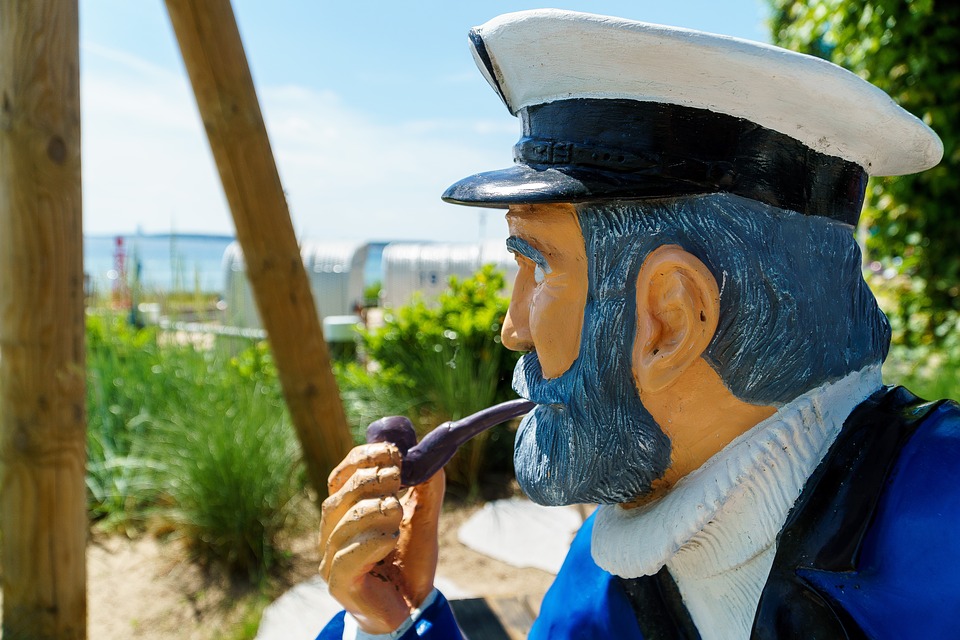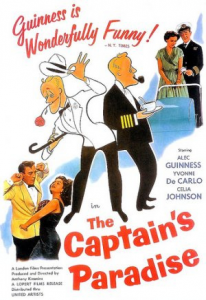
Finding Happiness in the Captain’s Not-So-Perfect, Double Life
Dakota Smith
Have you ever wondered what it would be like to live two different lives? Have you ever wanted to split life between the wild and the plain? In the 1953 film The Captain’s Paradise, one man does exactly that. The Captain’s Paradise is a about a boat captain that sails between two wives at two ports.
The bigamist Captain Henry St. James, played by Sir Alec Guinness, has a dutiful housewife in British Gibraltar and a fiery Latina wife in Spanish Morocco. In Gibraltar, Henry has a dutiful homemaker named Maud (played by Celia Johnson) who cooks, cleans, and makes sure that Henry has a beer waiting for him when he arrives home. Henry gives Maud gifts like vacuums and aprons. In Kalique, Henry is married to a hot-blooded, passionate dancer named Nita (played by Yvonne De Carlo) who stays up late and is constantly trying to improve her looks. Nita takes joy in late night dancing, and Henry gives her presents like lingerie and champagne.
In some ways, Henry is a typical sleazy sailor with a different woman in each port, but for Henry his bigamous lifestyle is part of a carefully-arranged system of living designed for a perfect, fulfilling happiness (from a man’s point of view). Life seems to be going great for Henry; he can experience domestic life on a Tuesday and night life on a Thursday, and between ports, he enjoys intellectual discussions with the male passengers on his ship at the captain’s table. As Henry explains to his first mate and chief disciple, he believes he has found ‘the perfect way of life’:
That, Rico, is my solution to man’s happiness on Earth. Two happy women, each in their way perfect, and in between the company of men, the clash of intellects to stimulate the mind.
As airtight as his system for living seems in the beginning, Henry grows careless and he switches up anniversary gifts, and later his wives meet in a chance encounter in Kalique. He is able to temporarily fix all of these mix-ups by paying others to do his dirty work or by providing excuses.
However, Henry is not able to fix the ways his wives are changing. Maud grows bored and wants to party at night instead of going to bed at 10:00 P.M. every night, and Nita wants to settle down before she grows too old to start a family. Henry is able to avoid these changes for a while by convincing Maud that all she really is desiring is children, and he persuades Nita that cooking will age her and ruin her beauty. Pretty soon, the changing in Maud and Nita’s characters is unavoidable. Nita becomes aggravated with Henry’s rambunctious nature and says that she is going to leave him for a taxi driver.
Things go south for Nita when in a dispute she shoots her taxi driver lover and Henry runs away—with what seems little regret or concern for her peril at the time—to his other wife. To his surprise, Maud is also leaving him to enjoy life like she never has before and to marry her cousin with whom she has been staying out late. To any woman who is watching this film and believes Henry is already getting justice for his bigamy, this would seem like enough, but the film doesn’t stop there.
Henry gives his captaincy and his boat to his disciple and second in command, Carlos Ricco (played by Charles Goldner). Ricco has helped Henry many times with keeping his secret, and Ricco even gets a visa from Henry so he can implement his own ‘perfect way of life’ plan. After giving Ricco his position and visa, Henry surrenders himself and takes the blame for the murder that Nita committed. He is sentenced to a firing squad for the murder, but Henry gets out of that too by bribing the firing squad to instead shoot their commander. Female moviegoers who would like to see Henry face justice are left slightly disappointed, but only slightly since Henry’s crimes might have merited punishment…but maybe not a firing squad.
While the plot of this film is a thrill ride that keeps you on your toes, it has some important messages, especially for the time, that audience members can take away. The first message is that women are not one-sided objects. This idea is obvious (for most) now, but not so much when the film was released. Women in film were often either promiscuous and fun or domestic and docile, with no variations between the two life styles. Henry had created the perfect life for himself by obtaining a wife with each lifestyle, but his genius plan is ruined when the women become more than one-dimensional characters. It is a bold and important takeaway from this film that women are multi-dimensional human beings, especially for a time when women were seen as wives and mothers, instead of individuals. Also, this film shows that different cultures view women in different ways. In Kalique, a fiery woman who stays out late is accepted and people are not shocked, but when Maud dances out late in Gibraltar it is seen as scandalous.
The film does not only speak on women though, but also on how corrupt people are. Characters in this film are constantly going behind each other’s backs and taking bribes. Henry bribes many officials in Morocco to keep his secret safe from his wives, Henry’s wives both go behind his back and find other men who accept their changes, and Ricco takes on the same foolish plan as Henry to get a second wife in Gibraltar. The characters in this film are constantly seen sneaking and breaking rules, which while refreshing for the time period, is wrong. We see men cheating on their wives and wives cheating on their husbands. We see government officials taking bribes to frisk women they do not know and wrongheaded executions.
This film shows the appalling and intriguing side of human nature in a funny, but meaningful way. It shows a multi-dimensional side to women and their characteristics. It shows the raw and disgusting thought processes of corrupt men and worldly officials. It shows the story behind couples that cheat on one another and the constant desire for change held by every person. However, when Captain St. James is sitting in the ship’s dining room and having a conversation with several other men on the passage between British Gibraltar and Spanish Morocco, the film’s creators hint at a more positive underlying message:
Professor Killick: Captain, the trouble with the human race is, that it’s entirely sub-human.
Captain St. James: There, Professor, I must raise a small cry of protest.
Professor Killick: I ignore it. Mankind has consistently misused science, ever since Prometheus brought down fire from Heaven.
Captain St. James: In my opinion… I was just going to say, that the only hope for civilization…
Professor Killick: [Interrupting] There isn’t any!
Captain St. James: …is that every device of science – radio, television, all of them – shall be used to show one half of the world how the other lives.
Mr. Wheeler: Well put, Captain.
Captain St. James: Within reason, of course…
Overall, in its own inverted way, The Captain’s Paradise provides a navigation for actual couples in the movie audience on how to make their own relationships better and more happy. The film is an intriguing story that offers a unique look into the life of a person who has lived a double life, and asks us to consider not only the complexities within ourselves, but also within those we love. Rather than insisting that our loved ones should live out an idealized one-dimensional existence for our own happiness, we should embrace all that makes our loved ones who they are…within reason, of course. Such acceptance can lead to a shared happiness that truly endures.
